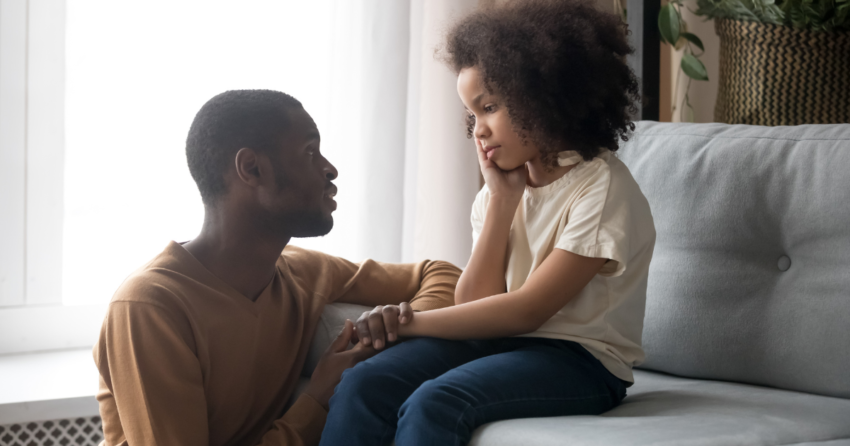Daddy Issues: The Silent Struggle of Fatherless Daughters

“He wasn’t there for my first steps, my graduations, or my heartbreaks. The void he left echoed through my life, shaping my relationships, my self-worth, and my deepest fears.”
Sound familiar? If so, you’re not alone. Studies suggest that nearly one in four children in the U.S. grow up without a father in the home. For daughters, this absence can create a unique set of challenges, often manifesting as “daddy issues” – a complex web of emotional wounds that can silently impact every aspect of their lives.
But behind the dismissive label lies a profound and often misunderstood struggle. It’s a yearning for love and validation that was never received, a fear of abandonment that haunts every relationship, and a persistent sense of unworthiness that whispers, “You’re not enough.” Daughters and their dads have a special bond. It shapes how they see themselves and the world. But, what if this bond is broken or missing?

So, what are “daddy issues,” and how can we help fatherless daughters? Let’s look at how common this is, the emotional pain it causes, and ways to heal.
This blog post is a safe space for fatherless daughters to feel seen, heard, and understood. We’ll delve into the science behind the father wound, explore its impact on women’s lives, and offer practical strategies for healing and empowerment. It’s time to break the silence, reclaim your worth, and rewrite your story.
Understanding the Impact of Fatherlessness
In the United States, many girls grow up without their dads. The National Fatherhood Initiative says 1 in 4 kids don’t live with their biological father. This can hurt a girl’s sense of who she is, how she feels about herself, and her ability to make good friends.
The Emotional Toll of an Absent Father
Girls without dads might feel bad about themselves, have trouble trusting others, and fear being left. They might also have hard times in love later on. Research shows that girls without dads often struggle with feeling good about themselves.
Girls without dads can find it hard to keep friends. They might fear getting hurt again. They might also eat too much or be overweight because they miss having a close dad.
Girls without dads might feel sad and even think about hurting themselves. They are more likely to start having sex early and get pregnant as teens. They might also turn to drugs or break the law.
Girls without dads might also struggle with addiction. They might use drugs or commit crimes. This can make it hard for them to feel good about themselves and trust others.
Getting over the hurt of not having a dad takes time and effort. It helps to talk to professionals, know yourself, and have friends who care. With help, people can heal and do well even without a dad.
The Lasting Effects of Fatherlessness
Not having a father can deeply affect a daughter’s feelings and mind. Daughters without fathers often feel low about themselves and struggle to trust others. They might also fear being left alone.
This can change how they choose partners or form relationships. They might pick partners who are not there for them or find it hard to keep relationships going.
Studies show that girls without fathers are more likely to face mental health problems. These include depression, anxiety, and eating disorders. They might also turn to drugs or other bad behaviors.
These girls often feel a strong need for a father’s love and guidance. They never got it, so they deeply miss it.
- Children without fathers are 47% more likely to live in poverty.
- Children from homes without fathers are 279% more likely to carry drugs or guns.
- Children without fathers are 2x more likely to be overweight.
- 71 percent of high school dropouts come from homes without fathers.
- 85 percent of youth in prison have no father.
- 90 percent of runaway kids have no father.
Without a father’s influence, a girl might find it hard to know who she is. She might not feel confident or sure about her choices. She might look to others for how she feels about herself.
“Fatherless Daughter Syndrome refers to the psychological and emotional challenges faced by girls who grow up without a consistent paternal figure.”
Understanding Fatherless Daughter Syndrome is the first step to healing. Counseling or support groups can help. They offer a safe place for girls to talk about their feelings and learn how to deal with them.

How To Overcome Daddy Issues
Healing from not having a dad is hard but doable. Steps like getting help from therapists or grief coaches help a lot. Also, loving and validating yourself can change your life.
Seeking Professional Support
Talking to a therapist or grief coach is very helpful. They help you deal with feelings and learn to have better relationships. It’s a safe place to face deep issues and grow.
Nurturing the Inner Child
Helping your inner child feel loved is key. This means practicing self-love and setting boundaries. It’s about giving yourself the care and acceptance you missed out on.
“The journey of healing from daddy issues is not an easy one, but it is a necessary one. With the right support and self-compassion, fatherless daughters can reclaim their power and build the fulfilling relationships they deserve.” – Jane Doe, Grief Coach
Getting over daddy issues is a personal journey. With help, self-love, and setting boundaries, you can heal. This leads to better relationships in the future.
Redefining Masculinity and Fatherhood
We need to change how we see masculinity to help fathers be more open with their feelings. The old idea of being “strong and silent” stops men from showing their emotions. By changing this, we can make a better place for dads and their kids.
Challenging Societal Norms
Oldly, dads were seen as tough and never showed feelings. But now, many dads are changing, being more open and caring. Being open helps dads connect better, shows kids how to be open, and makes them better at handling changes.
This change is hard because old ideas still stick around. But, dads talking openly with their kids is changing how we see masculinity. This change makes dads stronger, more caring, and better at understanding others.
- Men are now more invited to baby showers, showing a change in how we see dads’ roles.
- There’s not enough help for dads-to-be, unlike the help for moms.
- Jose wants to change how he parents, not repeating what he didn’t like from his dad.
- Jose believes in loving and supporting his child without condition.
- Jose finds it hard to be open but works on it to be a better parent.
- Jose talks openly with his child, unlike his dad, to stay connected.
Dads should share their stories, ask for help, and grow together. By being open, they can create a kinder world for their kids. Changing how we see masculinity helps dads be better, more caring, and inspiring for the future.

Building Healthy Relationships
Healing from a fatherless past is key to forming good relationships. For those without dads, it’s about setting boundaries, trusting, and talking openly. It’s also about stopping bad relationship patterns and finding self-worth.
With love for oneself and the right support, fatherless daughters can find the close bonds they’ve always wanted. They can avoid the mistakes of their past. By facing the issues from their father’s absence, they can build partnerships based on respect, trust, and closeness.
Getting help from a therapist is very helpful. Therapists help fatherless daughters understand their emotional needs. They teach them how to cope and change negative stories about love. This journey helps them learn to trust, set limits, and talk in ways that build lasting connections.
The first step to good relationships is healing from the past and caring for the inner child. By valuing oneself, fighting bad patterns, and learning to interact well, fatherless daughters can end the cycle of bad relationships. They can create deep, lasting bonds.
| Healthy Relationship Indicators | Unhealthy Relationship Patterns |
|---|---|
|
|
By facing the core issues of fatherlessness and valuing oneself, fatherless daughters can escape bad relationship patterns. They can create deep, lasting bonds based on trust, communication, and mutual respect.
Conclusion
The impact of not having a father on daughters is deep and complex. But, it’s not too hard to get over. By facing the emotional pain, getting help, and changing old ideas of being a man, daughters can heal. This healing journey helps them understand themselves better, love themselves more, and build a bright future.
We’ve learned a lot about the struggles of fatherless daughters. We know how common it is and how it affects their feelings and relationships. By talking openly about father-daughter bonds and changing what we think about being a man, we help them heal and grow.
Looking ahead, we must keep talking about this important issue. We need to give fatherless daughters the support they need. By starting open conversations, fighting wrong ideas, and encouraging good father-daughter bonds, we can make a better world. A world where everyone can grow and thrive, no matter their family story.



